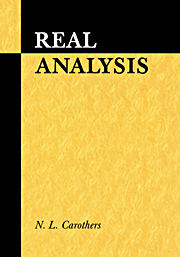Book contents
- Frontmatter
- Contents
- Preface
- PART ONE METRIC SPACES
- PART TWO FUNCTION SPACES
- 10 Sequences of Functions
- 11 The Space of Continuous Functions
- 12 The Stone–Weierstrass Theorem
- 13 Functions of Bounded Variation
- 14 The Riemann–Stieltjes Integral
- 15 Fourier Series
- PART THREE LEBESGUE MEASURE AND INTEGRATION
- References
- Symbol Index
- Topic Index
10 - Sequences of Functions
from PART TWO - FUNCTION SPACES
Published online by Cambridge University Press: 05 June 2012
- Frontmatter
- Contents
- Preface
- PART ONE METRIC SPACES
- PART TWO FUNCTION SPACES
- 10 Sequences of Functions
- 11 The Space of Continuous Functions
- 12 The Stone–Weierstrass Theorem
- 13 Functions of Bounded Variation
- 14 The Riemann–Stieltjes Integral
- 15 Fourier Series
- PART THREE LEBESGUE MEASURE AND INTEGRATION
- References
- Symbol Index
- Topic Index
Summary
Historical Background
Unarguably, modern analysis was formed during the resolution of an important controversy (or, rather, controversies) concerning the representation of “arbitrary” functions. This controversy has unfolded slowly over the last two centuries and was put to its final rest only in our own time.
The story begins in 1746 with the famous vibrating string problem. Briefly, an elastic string of length L has each end fastened to one of the endpoints of the interval [0, L] on the x-axis and is set into motion (as you might pluck a guitar string, for example). The problem is to determine the position y = F(x, t) of the string at time t, given only its initial position y = f(x) = F(x, 0) at time t = 0 where, for simplicity, we assume that the initial velocity Ft(x, 0) = 0. The function F(x, t) is the solution to d'Alembert's wave equation: Ftt = a2Fxx, where a is a positive constant determined by certain physical properties of the string. The initial data for the problem is F(x, 0) = f(x), Ft(x, 0) = 0, and f(0) = 0 = f(L).
The controversy, initially between d'Alembert and Euler, centers around the nature of the functions f that may be permitted as initial positions.
Information
- Type
- Chapter
- Information
- Real Analysis , pp. 139 - 161Publisher: Cambridge University PressPrint publication year: 2000
